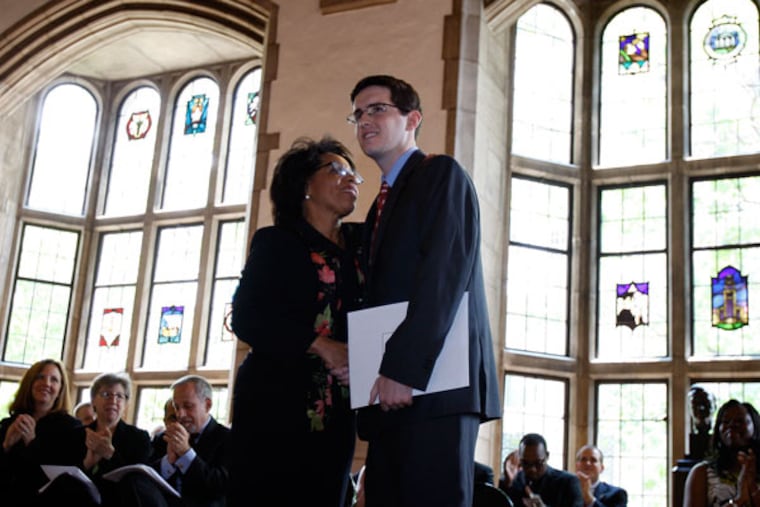Police-oversight head has capitalized on opportunities
A mysterious benefactor swoops in with a well-timed offer of assistance that, over time, has life-changing consequences. It's a scenario that has long been a staple of literature and mythology, but does it happen in real life?

A mysterious benefactor swoops in with a well-timed offer of assistance that, over time, has life-changing consequences.
It's a scenario that has long been a staple of literature and mythology, but does it happen in real life?
JoAnne Epps is confident it does.
Epps is dean of Temple University Law School, and she has no doubt that but for a chance visit by a young Trinity College student years ago, when she was a senior at Cheltenham High School, her life would have gone in a different direction.
Then-college student Jay Schinfeld was helping to recruit promising young minority students to Trinity. Schinfeld, now an Abington-based reproductive endocrinologist, had heard about Epps and offered to drive her to the Connecticut school for a visit with the dean of admissions.
"I found her extraordinarily bright and outgoing," Schinfeld recalled.
Her parents didn't have the money to pay for the kind of far-flung college tour that is a rite of passage for many young people, so Epps was happy to accept. A few months later, with an offer of tuition assistance in hand, she was enrolled as a freshman at the elite private college.
That was the first stop in a long career in education and the law for Epps, who on Wednesday was named chair of a police oversight board with responsibility for ensuring that Philadelphia implements the recommendations of a Justice Department report finding that police too often use lethal force, in part because of poor training.
Epps said it was far too soon to have a sense of how the city will proceed with the task of revamping policies on the use of lethal force. But she has long experience tackling politically sensitive issues.
Late last year, Mayor Nutter appointed her to the city ethics commission, and since 2011 she has been the court-appointed monitor overseeing city efforts to revamp the stop-and-frisk tactics of Philadelphia police.
Although the latest Justice Department report found that police were inadequately trained in the use of lethal force, and that departmental review of incidents in which officers discharged their weapons was lacking, Epps characterized police relations with residents of the city as relatively stable.
"I don't think we are on the precipice of a Ferguson-like incident," she said. However, she added, "there are people who view the police as adversaries, and that is unfortunate. The challenge that Police Commissioner [Charles] Ramsey is embracing is challenging those mind-sets."
Epps graduated in 1973 from Trinity, where she was a cheerleader for a time, and got her law degree from Yale. Her first job out of law school was as a city prosecutor in Los Angeles. In 1980, she came back to Philadelphia to join the U.S. Attorney's Office, where she was an assistant prosecutor trying criminal cases.
She joined the Temple Law faculty in 1985 and was named dean in 2008, when the future still seemed bright and untroubled for both law schools and their students.
But within months of her appointment as dean, on Sept. 15, 2008, the onetime Wall Street powerhouse Lehman Bros. filed for bankruptcy. The Great Recession was on, corporate America was pulling back, and the big law firms that until then seemed to have an insatiable demand for young law students sharply reduced hiring.
For Epps and other law school deans, it meant managing in a time of crisis. Temple has fared relatively well since then, and has even gone up in the rankings. But just like other middle-tier law schools, it has had to reduce enrollment as applications have declined.
Carl Singley, a longtime Philadelphia lawyer and former Temple Law School dean who recruited Epps, said she quickly established herself as a teacher with bright prospects.
"We knew back then she would be a star; students loved her as a professor," said Singley, who also praised her administrative skills.
Her circumstances as a child didn't necessarily foreshadow a heady academic and law enforcement career.
Epps' father was a laborer and her mother a secretary. For a few years at Trinity, she planned on becoming a legal secretary because that was all she could imagine doing. In her world growing up, there were no role models of adults in professional positions. But a Trinity dean, after hearing of her plans, suggested that she become lawyer, planting a seed that eventually would grow into a career.
At the start, of course, there were obstacles. When she entered the legal profession, there were few women and few blacks. She credits her instinct for pushing forward with helping her to clear hurdles.
"I think of myself as careful and cautious, not at all reckless," Epps wrote recently in her blog. "But looking back, it seems I've dared a lot. Much of the daring came from moving forward when the world in front of me was completely opaque. I now realize that I had a lot I had to figure out for myself and by myself. It's like stepping into a dark room and hoping you find your way around without too many bumps and bruises."
215-854-5957 @cmondics